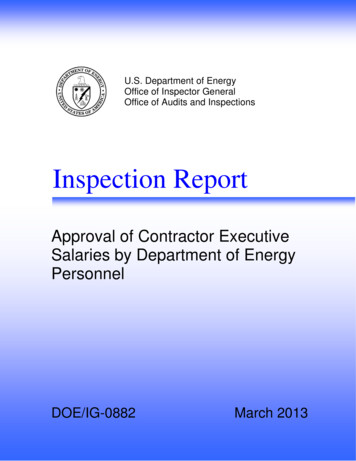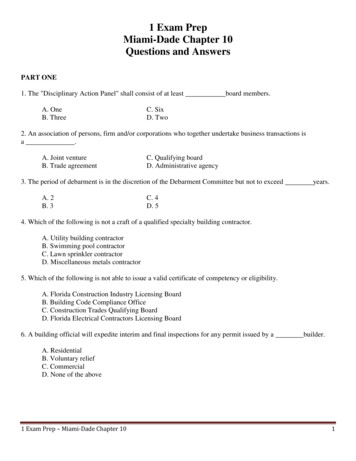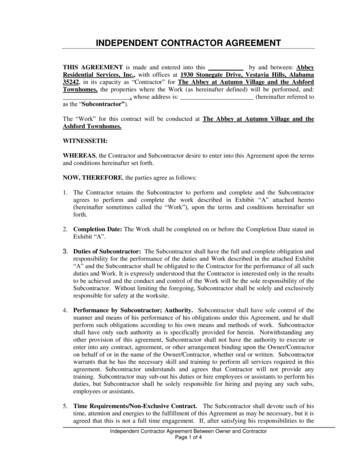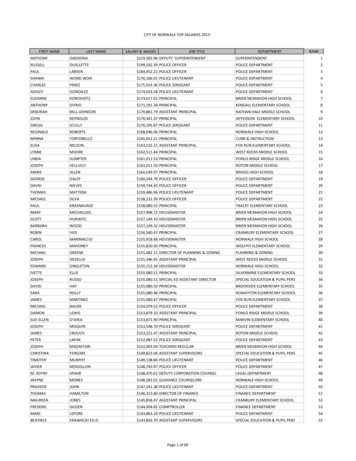
Transcription
U.S. Department of EnergyOffice of Inspector GeneralOffice of Audits and InspectionsInspection ReportApproval of Contractor ExecutiveSalaries by Department of EnergyPersonnelDOE/IG-0882March 2013
Department of EnergyWashington, DC 20585March 22, 2013MEMORANDUM FOR THE SECRETARYFROM:Gregory H. FriedmanInspector GeneralSUBJECT:INFORMATION: Inspection Report on "Approval of ContractorExecutive Salaries by Department of Energy Personnel"INTRODUCTION AND OBJECTIVEIn April 2011, the Department of Energy awarded a nearly 2.2 billion contract to URS CH2MOak Ridge, LLC, (UCOR) for the environmental cleanup at the East Tennessee TechnologyPark, Oak Ridge, Tennessee. As a support provider for the Office of EnvironmentalManagement (EM), the Oak Ridge Office (ORO) is responsible for oversight of the UCORcontract, including analyzing and performing market analyses to assess the reasonableness of theproposed contractor executive salaries.The Department is the largest civilian contracting agency within the Federal governmentconsisting of a contractor workforce of about 100,000, with some receiving executive salary. InAugust 2007, the Office of Inspector General issued five reports on executive salaries and fringebenefits for contractors working for the Office of Science, the National Nuclear SecurityAdministration and EM. These reports concluded that there were questioned and unallowablesalary and fringe benefit costs of about 386,000 at two Department national laboratories.Management took corrective actions in response to our reports.The Office of Inspector General received a complaint alleging that an ORO senior managementofficial approved salaries for UCOR executives that were higher than the ORO HumanResources (ORO HR) calculated market rates without proper authority. We initiated thisinspection to examine the facts and circumstances surrounding the allegation.RESULTS OF INSPECTIONOur inspection confirmed the essence of the complaint. The review revealed that a former OROsenior management official deviated from requirements established in the awarded contract byapproving UCOR contractor executive salaries that were higher than the market rates calculatedby ORO HR officials. Specifically, we found that: Without proper authority, a former ORO senior management official approved 10contractor executive salaries that exceeded market salary rates calculated by the ORO HRoffice. In the two most extreme cases, one executive's annual base salary determination
2was 82 percent higher than the ORO HR calculated market rate, from 164,889 to 299,800; and the other was 74 percent higher than the ORO HR calculated market rate,from 194,400 to 337,581. During the course of our inspection, and after we questioned the initial salary approvals,ORO rescinded these approvals. Subsequently, a senior ORO procurement officialapproved salary increases for all 10 contractor executives at the same level UCORrequested in its original contract proposal, without regard to established ORO HRcalculated market rates. The annual salary difference ranged from 5,741 to 143,181per executive over the ORO HR recommended market rates for the Oak Ridge area.Our inspection identified uncertainty and a number of significant missteps related to the processfor reviewing and approving proposed contractor executive salaries when new contracts wereawarded. For example, ORO and Headquarters officials mistakenly assumed that the executivesalary amounts submitted by UCOR were found to be reasonable by the Source EvaluationBoard (SEB) officials during the contract pre-award phase. After we questioned the process, aprocurement official at ORO even went so far as to prepare a document certifying that anexecutive salary reasonableness determination had been made during the SEB process. Wedetermined, however, that despite ORO's assurances and a signed certification, the SEBresponsible for reviewing UCOR's proposal had not actually performed such a review. Instead,SEB officials told us that they expected that UCOR executive salaries would be set based on theORO HR market analysis.We discussed the salary setting procedures with Headquarters program officials, who told usthey were under the impression that a new process for setting contractor executive salaries hadbeen adopted by ORO procurement officials. As such, they did not believe that the DepartmentAcquisition Letter 2007-02, Contractor Executive Compensation, applied. Acquisition Letter2007-02 provides guidance on the compensation of contractor senior executives under allcontracts and references the sections of the Federal Acquisition Regulation needed to determinereasonableness. We ultimately determined that the market analysis, referenced in the FederalAcquisition Regulation and Department Order 350.1, Contractor Human Resource ManagementPrograms, had actually been performed by ORO HR staff; however, both ORO management andprocurement officials elected not to use the calculated market salary rates completed by OROHR when establishing UCOR executive salaries. The former ORO senior management officialwho ultimately approved the salary increases explained that ORO approved them because itbelieved that it had the authority to do so. The former official acknowledged that in doing so,ORO had inadvertently circumvented the Department's prescribed approval process. Therefore,approving officials did not specifically evaluate the proposed executive salaries nor could theyprovide information indicating that the salary increases were reasonable.During a subsequent discussion of an initial draft of this report, ORO and EM officials told usthat they used the SEB pre-award process to determine reasonableness of executive salaries. Assuch, ORO and EM officials asserted that they had not circumvented the Department's prescribedapproval process. The officials also indicated that the SEB obtained audit services from anindependent consulting firm to assess the reasonableness of the salaries. However, we were toldby the consulting firm that an assessment of the reasonableness of a contractor's salary was
3outside of its scope of work. The consulting firm officials indicated that their assessmentfocused on determining whether the proposed total compensation of UCOR key personnelexceeded the per executive total compensation benchmark ( 693,951 at the time of theassessment) established by the Office of Federal Procurement Policy. We discussed the resultswith ORO senior management officials and they acknowledged the fact that the consulting firmdid not perform a reasonableness assessment of contractor executive salaries.In light of current budgetary pressures, we concluded that the Department needs to implementand execute measures to ensure that contractor executive salaries are: (i) reasonable; (ii)consistent with local market compensation rates; and (iii) developed using establishedDepartmental procedures. Anything less could adversely impact ORO missions by divertingfunds from other pressing mission needs. In this particular case, the Department could incurapproximately 3.45 million over the market rate salaries for 10 UCOR contractor executivesalaries over the life of the 5-year contract.To help clarify contractor salary setting requirements and prevent recurrence of the eventsdescribed in our report, we made several recommendations.MANAGEMENT REACTIONManagement generally concurred with the recommendations in the report. Specifically, theDirector, Office of Acquisition and Project Management agreed to take action to updateDepartment policy. ORO and EM management committed to provide guidance and developpolicies and procedures consistent with the updated policy. ORO, in conjunction with EM, willrender a reasonableness determination regarding the UCOR contractor executive salaries. Asappropriate, we modified our report to address other technical comments from management.The comments provided by the Office of Acquisition and Project Management, Office ofEnvironmental Management, and ORO are included in Appendix 3.Attachmentcc:Deputy SecretaryDeputy Assistant Secretary, Acquisition and Project Management forOffice of Environmental ManagementChief of StaffDirector, Office of Acquisition and Project ManagementManager, Oak Ridge Office
REPORT ON APPROVAL OF CONTRACTOR EXECUTIVE SALARIESBY DEPARTMENT OF ENERGY PERSONNELTABLE OFCONTENTSContractor Executive SalariesDetails of Finding1Recommendations8Comments9Appendices1. Objective, Scope and Methodology112. Prior Reports123. Management Comments14
APPROVAL OF CONTRACTOR EXECUTIVE SALARIES BYDEPARTMENT OF ENERGY PERSONNELCONTRACTOREXECUTIVESALARIESGenerally, the Department of Energy (Department) requires that areasonableness determination be made when setting contractorexecutive salaries. Such requirements were established in FederalAcquisition Regulation (FAR) 31.205-6, Compensation forPersonal Services, and FAR 31.201-3, DeterminingReasonableness, and Department Order 350.1, Contractor HumanResource Management Programs. Federal procurement officialscharged with oversight of the contract must perform a marketanalysis and/or make a determination that contractor proposedsalaries are reasonable. The Department's Acquisition Letter 200702, Contractor Executive Compensation, published onApril 3, 2007, provides guidance on the compensation ofcontractor senior executives under all contracts and the salary ofthe top contractor management official under management andoperating contracts and other contracts designated by the SeniorProcurement Official. Acquisition Letter 2007-02 referencessections of the FAR applicable to making such reasonablenessdeterminations. Acquisition Letter 2007-02 also sets a thresholdfor executive salaries to the lesser of 10 percent above thecandidate's current salary or 6 percent above the prior contractor'sexecutive reimbursed salary. Further, Acquisition Letter 2007-02mandates that any salaries higher than the thresholds requireapproval from the Senior Procurement Executive.We substantiated the allegation that a former Oak Ridge Office(ORO) senior management official approved contractor executivesalaries for URS CH2M Oak Ridge, LLC, (UCOR) without properauthority. The events leading up to the UCOR salary approvalsinvolved Headquarters and ORO officials taking a number ofactions that were inconsistent with existing policy and were notwell coordinated. These actions resulted in higher UCOR salariesthat, if left unmodified, could cost the Department an additional 3.45 million over the life of the 5-year contract.Review and Approval of SalariesOur inspection revealed that responsible Federal officials at OakRidge did not use the Department's procedures for settingcontractor executive salaries. During the post-award process inJune 2011, UCOR submitted proposed salaries for its executives.The UCOR proposal called for salaries ranging from 229,250 to 360,000, which exceeded ORO Human Resources (ORO HR)Page 1Details of Finding
comparison of salaries paid under the previous contractor tocurrent market rates. As specified by the Department's Request forProposal, 30 days after contract award, UCOR's Prime ContractManager submitted a formal request to ORO for approval of thesalaries of its top 10 executives.After submission, and based on the results of a market analysis,ORO HR officials made a reasonableness determination that salaryincreases should not exceed 6 percent above the prior contractor'sexecutives reimbursed salary. Following the advice provided byORO HR, an ORO procurement official approved therecommended salaries. While the approved salaries were in linewith those recommended by ORO HR, they were significantlylower than those proposed by UCOR. ORO procurement officialstold us that UCOR did not agree with the lower salaries and inAugust 2011, UCOR provided ORO HR additional supportingdocumentation that it believed justified the higher proposedexecutive salaries. After analyzing the UCOR submitted data,ORO HR officials took action to increase the salaries for 7 of the10 UCOR executives. The second round of executive salaryapprovals were still significantly less than those originallyrequested by UCOR. We noted that the Acquisition Letter 200702 was referenced in each of the approval letters signed by theORO procurement official and the former ORO seniormanagement official.In spite of the increases provided in August 2011, UCOR remainedunsatisfied with executive compensation levels and requestedreconsideration of its originally proposed salary levels. UCORnoted that it believed the requested salary levels were justifiedbecause it was able to recruit the high caliber 10 key executivesbased on salary proposals it had made in its original proposal.Various ORO officials told us that they examined the renewedrequest by UCOR but did not believe that the increases could beapproved by anyone other than the Headquarters SeniorProcurement Executive. We were told that even though OROmanagement officials were aware of the opinions expressed byvarious members of the professional staff, in November 2011, aformer ORO senior management official approved the salaries forthe 10 key executives as originally proposed by UCOR. We couldnot determine whether the former ORO senior management officialspecifically considered the market analysis or salaryrecommendations made by ORO HR prior to making the decisionPage 2Details of Finding
to approve the salary increases. In addition to approving the highersalaries, the former ORO senior management official, withoutexplanation, also indicated in the letter to UCOR that the proposedsalaries were retroactive from August 1, 2011.The following table details the various contractor executive salary setting actions taken by ORO.Proposed and Approved Contractor Executive ecutiveSalaries 155,556 183,396 149,292 151,596 152,424 163,884 182,556 305,004 240,000 proved by aFormer OROSenior Official 299,800 337,581 249,000 242,000 230,000 229,250 246,210 360,000 274,200 232,500ORO HRCalculatedMarket Rates forUCORExecutiveSalariesPercentAbove ORO HRMarket RateUCORExecutiveSalariesDifferencebetween OROHR Market Rateand UCORProposedExecutiveSalaries827457514232271183 134,911 143,181 90,750 81,308 68,430 55,533 52,701 36,700 19,800 5,741(June 24, 2011)* 164,889 194,400 158,250 160,692 161,570 173,717 193,509 323,300 254,400 226,759*Note: Although we did not validate the market rates calculated for UCOR, these figures wereprovided to the Office of Inspector General by ORO HR subject matter experts responsible fordetermining appropriate executive salary compensation. Therefore, for the purposes of thisreport we relied upon the market analysis provided to and used by the Contracting Officer.CONTRIBUTINGFACTORSThe issues identified in this report were the result of severalcontributing factors, including inconsistently applied guidancerelated to the process for setting salaries. The details arediscussed below.Inconsistently Applied GuidanceOur inspection revealed that the former ORO senior managementofficial approved the UCOR executive salaries without ensuringthat the action conformed to Department guidance. In particular,the former official did not comply with Acquisition Letter 2007-02that specifies that Heads of Contracting Activities can approve anincrease to salaries only after obtaining approval from thePage 3Details of Finding
Headquarters Senior Procurement Executive. Acquisition Letter2007-02 also requires the Senior Procurement Executive to consultwith the cognizant Program Secretarial Officer prior to grantingapproval for the higher salaries. However, we learned that thesesteps were not taken prior to approval of UCOR's executivesalaries.On December 7, 2011, we brought this matter to the attention ofthe former ORO senior management official who approvedUCOR's executive salaries. We were told that immediatecorrective actions would be initiated to ensure the proper processwas executed to provide support for the higher salaries for the 10UCOR executives. The former ORO senior management officialalso informed us that although a letter approving the increases hadbeen signed, the process was not final because Form 3220.5,Application for Contractor Compensation Approval, was notsigned and processed through ORO HR, as required. The sameORO senior management official acknowledged that prior to ourmeeting, an ORO HR official had explained that because theHeads of Contracting Activities had not been consulted, the OROsenior management official did not have authority to sign theapproval letter or the Form 3220.5.On December 10, 2011, shortly after our meeting with the formerORO official who had taken action to approve the salaries, OROissued a letter rescinding the UCOR executive salaries, which hadbeen approved on November 10, 2011, until further notice. Theletter stated that "UCOR is only authorized to charge to thegovernment the salary amounts approved in the letter dated June 24,2011. Any amount higher than the salaries approved in June 24thletter are unallowable."In spite of this action, the higher salaries were billed to theGovernment and drawn directly against the Department's letter ofcredit retroactive from August 1, 2011, except for the periodbetween December 10, 2011, and January 23, 2012.On January 23, 2012, the senior ORO procurement officialsubsequently approved the full amount of the UCOR requestedsalaries for all 10 contractor executives. During our discussionswith this senior ORO procurement official in January 2012, theofficial took responsibility for making the reasonablenessdetermination and independently approving the higher salaries.Page 4Details of Finding
Although requested, the official did not provide us documentationto demonstrate how the reasonableness of the salaries wasdetermined.Salary Setting ProcessThe issues we identified were the result of two contributingfactors— confusion regarding what guidance was operative and thefailure of field officials to consistently apply existing Departmentguidance. Senior Headquarters program officials informed us thatthey assumed that ORO, as well as other sites, was no longer usingAcquisition Letter 2007-02, and were using a new process toestablish contractor executive salaries. Specifically, officials fromthe Office of Environmental Management (EM), and ORO seniorofficials indicated that the process for setting contractor executivesalaries was based on a reasonableness determination made duringthe Source Evaluation Board (SEB) process (the pre-award phase).After we made inquiries regarding guidance on contractorexecutive salary determinations, senior Headquarters EM officials,as well as specific ORO senior officials, specifically told us thatreasonableness for UCOR executive salaries had been determinedduring the SEB process. Further, a senior ORO procurementofficial stated that according to senior Headquarters Office ofAcquisition and Project Management (OAPM) and EM officials,Acquisition Letter 2007-02 did not apply. Specifically, and againafter the fact and after our inquiry began, Headquarters officialsnotified the senior ORO procurement official that the SEB processwould have already determined reasonableness for the UCORsalaries and that the senior ORO procurement official's signaturefor approval would suffice.In February 2012, another ORO procurement official (notpreviously discussed) prepared and signed a document identifyingthe contractor executive salaries process used during the pre-awardphase. The document included information stating that the OROprocurement official made the reasonableness determination duringthe SEB process for proposal evaluation. The document also notedthat as part of the SEB's Cost Analysis, the "Cost Report evaluatedthe executive compensation levels of the Key Personnel for eachofferor." Furthermore, "As part of the SEB evaluation, a costanalysis was performed of each offer, which included . . . a fair andPage 5Details of Finding
reasonable price or to determine cost realism." Despite theaffirmation, we discovered that the SEB had not actuallyperformed these steps.Our inspection revealed that SEB officials had not made areasonableness determination or performed a market analysis ofthe UCOR executive salaries. SEB members told us that they hadinstead deferred to the ORO HR official's assessment that washistorically conducted during the post-award review. In fact, thesenior SEB official and the financial SEB official explained thatthe members had not made a reasonableness determination and thatthey did not review any market data for comparison to the fiveoffers as would have been necessary to reach a determination.These officials also stated that they did not have the training or theexpertise to make a professionally-based reasonablenessdetermination concerning UCOR's executive salaries. Further, thefinancial SEB official stated that there was not a reasonablenessdetermination made during the SEB process because it was a longstanding ORO practice that ORO HR makes this determinationduring the post-award phase of the contract.We were informed by an EM official that a similar incidentoccurred last year at the Department's Environmental ManagementConsolidated Business Center (EMCBC) in Cincinnati, Ohio.EMCBC serves EM in providing contract award, administrationand related services for 15 Department sites. The same EMofficial advised EMCBC that Acquisition Letter 2007-02 was notapplicable and that a determination on the reasonableness ofsalaries had been made as part of the SEB process. As noted bythis official, the direction provided to EMCBC and ORO wasessentially the same; however, we did not assess EMCBC'sexecutive salary determination process during this inspection.On March 16, 2012, a senior EM official issued a memorandumrequesting revisions of Acquisition Letter 2007-02, requiring SEBofficials to perform the pre-award compensation analysis. Thememorandum further indicated that the ORO procurement officialverified that the UCOR executive salaries were determined to bereasonable in the contractor's proposal and contained in thecontract. As mentioned previously, it was not until February 2012,approximately 10 months after the award of the contract, that theContracting Officer signed and provided us a written documentoutlining salary reasonableness. We requested, but have notreceived, any additional evidence that a reasonablenessdetermination was performed for UCOR's proposed and approvedPage 6Details of Finding
executive salaries by the voting SEB members. Therefore,regardless of the guidance followed (Acquisition Letter 2007-02 orSEB Process), we were unable to obtain any evidence to supportthe final determination for UCOR's executive salaries.In a subsequent discussion on the initial draft of this report anddespite direct evidence to the contrary from SEB members, OROand EM officials still contend that they used the SEB pre-awardprocess to determine reasonableness of executive salaries. OROindicated that Acquisition Letter 2007-02 does not apply to preaward actions or to non-Management & Operating (M&O)contracts (UCOR contract is cost plus award fee). ORO and EMofficials also indicated that the reasonableness determination wasmade based on conformity with compensation practices of otherproposing firms of similar size in the same industry performingdecontamination and decommissioning work, performing work inthe same geographic area, and performing similar work undercomparable circumstances. Moreover, we were told by OROofficials "as part of the reasonableness and realism determination,"the SEB obtained audit services of an independent consulting firm.As such the officials asserted that they did not inadvertentlycircumvent the Department's prescribed approval process. Theconsulting firm informed us, however, that it focused onreasonableness as it pertained to whether the proposed totalcompensation of any UCOR key personnel exceeded the totalcompensation benchmark. The consulting firm also told us that itwas outside of its scope of work to review contractor keypersonnel salary for reasonableness based on FAR Parts 31.205-06and 31.201-3.Further, ORO management has acknowledged that in transitioningto a new type of contract, Department officials inadvertently citedthe requirements of Acquisition Letter 2007-02 in the contract.Associated process and procedural issues in this matter resulted indiffering actions that should not have been taken. ORO isdeveloping processes and protocols to preclude a repeat of thesituation in the areas of training for all staff involved in acquisitionmatters, developing specific steps in assessing executivecompensation and specifying roles of the SEB, ContractingOfficer, etc.Page 7Details of Finding
OVERALL IMPACTIn light of current budgetary pressures, we concluded that theDepartment needs to implement executive measures to ensure thatcontractor executive salaries are: (i) reasonable; (ii) consistentwith local market compensations rates; and (iii) established usingDepartmental procedures. Anything less could adversely impactORO missions by diverting funds from other pressing missionneeds. In this particular case, the Department could incurapproximately 3.45 million over the market rate salaries for 10UCOR contractor executive salaries over the life of the 5-yearcontract.RECOMMENDATIONSAlthough the Department had taken a number of actions to addressmany of the deficiencies that we identified, we believe thatadditional actions are necessary. To help address the issues withinconsistently applied guidance, improve the contractor executivesalary setting process, and better control salary costs in this area,we recommend that the Director, Office of Acquisition and ProjectManagement:1. Update the policy on contractor executive salaries toinclude the applicable methodology and the requirementto fully document reasonableness determinations(whether it is pre-award or post-award of the contract);and,2. Ensure that the Department's contracts include theamended process for contractor executive salaryreasonableness determinations based on revisions to thepolicy.We also recommend that the Manager, Oak Ridge Office:3. Ensure the policy and procedures are consistently appliedfor documenting a reasonableness determination ofcontractor executive salaries during pre-award or postaward of the contract; and,4. Complete a reasonableness determination regarding theUCOR executive salaries and adjust rates as appropriate.Page 8Recommendations
We also recommend that the Deputy Assistant Secretary,Acquisition and Project Management for Office of EnvironmentalManagement:5. Ensure the policy and procedures are consistently appliedfor documenting a reasonableness determination ofcontractor executive salaries during pre-award or postaward of the contract.MANAGEMENT ANDINSPECTORCOMMENTSManagement generally concurred with each of the five recommendations in the report. Specifically, regarding recommendation 1,the Director, Office of Acquisition and Project Management agreedto update the acquisition letter to clarify the applicability to nonM&O contracts and emphasize the necessity of followingDepartment Order 350.1 and FAR 31.205-6(b), when determiningreasonableness of contractor salaries. Also, managementconcurred in principle with recommendation 2, stating thatDepartment Order 350.1 provides sufficient language requiring thecontractor to provide supporting justification for consideration ofthe initial and proposed changes to executive salary actions (seeDepartment Order 350.1, Chapter IV, Attachment 1, page IV-4,paragraph 4a of the Contractor Requirements Document).However the Department is in the process of eliminating thereferenced Contractor Requirements Document from DepartmentOrder 350.1 and incorporating the language directly into theapplicable contracts. This revision is being carried out through aDepartmental enterprise risk management initiative and willtransfer language from the Contractor Requirements Documents ofChapters IV through VI of Department Order 350.1 to the SpecialH Clause of the applicable Department contracts. We believe thatthe planned corrective actions by OAPM for the tworecommendations will emphasize and clarify the process neededfor contractor executive salary reasonableness determinations andmarket analysis, whether it be pre-award or post-award.The ORO Manager concurred with recommendations 3 and 4in the report and indicated that ORO will ensure that localprocesses and procedures are in place to implement Departmentalpolicy and guidance as it is developed. Also, ORO along with EMwill conduct an analysis using all relevant data and informationand will render a reasonableness determination regarding theUCOR salaries. Although the ORO Manager concurred, ORO isPage 9Management and Inspector Comments
maintaining the position that Acquisition Letter 2007-02referenced in the report provides two paths for determiningappropriate executive compensation — one for M&O contracts orthose designated by the Senior Procurement Executive, and theother for non-M&O contracts. Further, ORO commented that thecompensation stated as appropriate in the report appears to bebased on the first contract path mentioned. We determined that ifthe Acquisition Letter 2007-02 did not apply, then all designatedcontractor executive salaries must be approved by the SeniorProcurement Executive. However, we maintain that at the time ofour review, the acquisition letter applied to all contracts. Inaddition, according to the Director, Office of Acquisition andProject Management, the office will make the acquisition letterclearer and will indicate its applicability to non-M&O contracts.Further, ORO indicated that UCOR salary levels were in themiddle of the competitive proposals received and that the salarylevels parallel execut
02, Contractor Executive Compensation, published on April 3, 2007, provides guidance on the compensation of contractor senior executives under all contracts and the salary of the top contractor management official under management and operating contracts and other contracts designated by the Senior Procurement Official.










